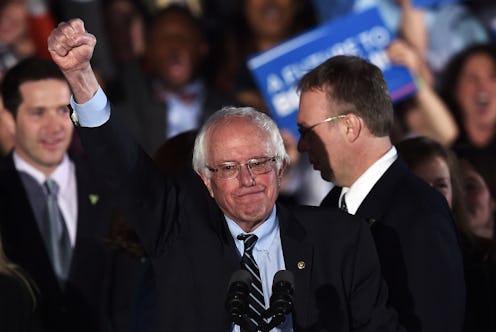News
How Many Delegates Bernie Sanders Earned In NH
The first primary of the 2016 election season took place Tuesday night. Though voter turnout appeared to be massive, the results of the New Hampshire primary were revealed quite quickly. On the right, Donald Trump was the winner, while Bernie Sanders claimed a resounding victory on the left. Democratic frontrunner Hillary Clinton called Sanders to congratulate him, and delivered an impassioned speech thanking her supporters. Despite the Sanders victory, Clinton continues to have her fellow candidate beat based on overall delegates in the Democratic Party. The number of delegates Sanders earned in New Hampshire is minimal compared to Clinton's cumulative total of 394.
The Vermont senator emerged from New Hampshire with at least 13 Democratic delegates, putting his overall total at 42. Some of those came from the Iowa caucuses, where Sanders placed second and earned at least 21 delegates. Meanwhile, Clinton earned at least nine in the Granite State. In a victory speech delivered at Concord High School, Sanders had this to say about his dominating performance in New Hampshire:
Our volunteers worked night and day, made phone calls, and knocked on a heck of a lot of doors, and we won because of your energy ... The people of New Hampshire have sent a profound message to the political establishment, to the economic establishment, and by the way, to the media establishment. What the people here have said is given the enormous crises facing our country, it is just too late for the same old, same old establishment politics, and establishment economics. The people want real change.
Sanders' major weak point appears to be garnering superdelegate votes. Superdelegates are independent elected and party officials who can endorse whomever they please. The Vermont senator has been serving his state as an independent since taking office and considers himself a Democratic socialist. Establishment politicians appear to be less likely to endorse a candidate who has only recently become Democratic in name. Superdelegates make up around 15 percent of the overall allotment of Democratic delegates, numbering 712 in all.
In a November AP survey, Sanders had been projected to net just eight superdelegates for every 359 that Clinton earned. Even if those dismal numbers were to hold true, Sanders could still nab the Democratic nomination based on primary and caucus wins alone. The senator's victory in New Hampshire certainly isn't something to shrug at. As both candidates eye the Nevada caucuses, which kick off on Feb. 20, they are looking to court everyday voters — not just those in the establishment. Sanders' New Hampshire success, combined with his upcoming debate performance, may be just enough to earn him another victory and even more delegates. Meanwhile, presidential hopefuls brace themselves for the ultimate delegate event: March's Super Tuesday.
Believe it or not, both primaries and caucuses can be laugh-out-loud hilarious. Don't believe us? Have a listen to Bustle's The Chat Room podcast ...
